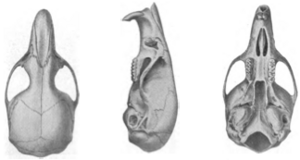Unicolored Oldfield mouse facts for kids
Quick facts for kids Unicolored Oldfield mouse |
|
|---|---|
 |
|
| Holotype skull. | |
| Conservation status | |
| Scientific classification |
|
| Kingdom: | Animalia |
| Phylum: | Chordata |
| Class: | Mammalia |
| Order: | Rodentia |
| Family: | Cricetidae |
| Genus: | Thomasomys |
| Species: |
T. monochromos
|
| Binomial name | |
| Thomasomys monochromos Bangs, 1900
|
|
| Script error: The function "autoWithCaption" does not exist. | |
Script error: No such module "Check for conflicting parameters".
The unicolored Oldfield mouse (scientific name: Thomasomys monochromos) is a small rodent that lives only in Colombia, a country in South America. It's a special kind of mouse because it's found nowhere else in the world! This mouse belongs to the family called Cricetidae, which includes many types of hamsters, voles, and other mice.
Contents
About the Unicolored Oldfield Mouse
The unicolored Oldfield mouse is a fascinating creature. It's named "unicolored" because its fur is mostly one color. Scientists study these mice to learn more about their lives and the environments they live in.
Where This Mouse Lives
This special mouse lives only in the country of Colombia. It prefers certain types of habitats, often found in the high Andes Mountains. These areas can be cool and misty, with lots of plants. The mouse makes its home in these unique environments.
What It Looks Like
The unicolored Oldfield mouse is a small mammal. Its fur is usually a single color, which helps it blend into its surroundings. Like other rodents, it has sharp front teeth for gnawing. Its body is built for moving quickly through dense vegetation.
What It Eats
While we don't have exact details for this specific mouse, most Oldfield mice are omnivores. This means they eat a mix of plants and small insects. They might munch on seeds, fruits, leaves, or even tiny bugs they find on the forest floor.
Protecting This Special Mouse
The unicolored Oldfield mouse is considered a vulnerable species. This means it faces challenges that could lead to its numbers decreasing. Protecting its home is very important.
Why It Needs Protection
Because the unicolored Oldfield mouse lives only in Colombia, it's an endemic species. This makes it extra special and also more vulnerable. If its habitat is damaged, there's nowhere else for it to go. Things like changes in land use can affect where these mice live.
Conservation Efforts
Organizations like the International Union for Conservation of Nature (IUCN) keep track of species like the unicolored Oldfield mouse. They classify it as "Vulnerable" (VU). This helps people know that efforts are needed to protect this unique animal and its home. Protecting its natural environment helps ensure these mice can continue to thrive.
Who Discovered This Mouse?
The unicolored Oldfield mouse was first described by a scientist named Outram Bangs in the year 1900. When a new animal is discovered, scientists give it a unique name. This helps everyone know exactly which species they are talking about.
See also
 In Spanish: Thomasomys monochromos para niños
In Spanish: Thomasomys monochromos para niños
 | Georgia Louise Harris Brown |
 | Julian Abele |
 | Norma Merrick Sklarek |
 | William Sidney Pittman |


